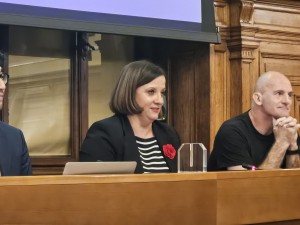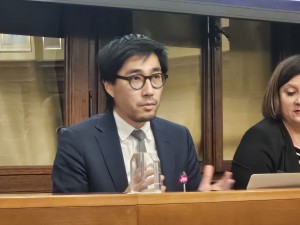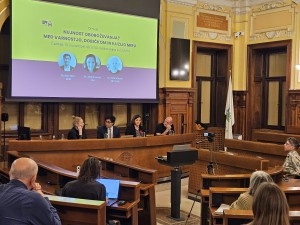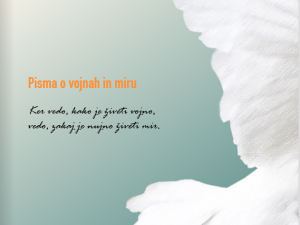Living Peace 22: Letters of Wars and Peace
20. 6. 2025 | Politics
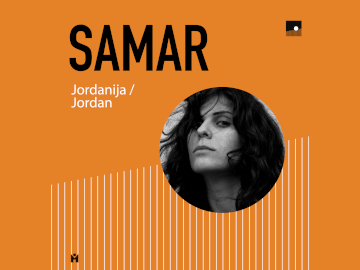
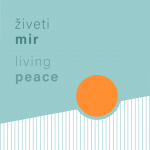 At the end of 2022, we at the Peace Institute, started organizing a series of public events entitled Thinking Peace as a response to the multitude of armed conflicts around the world. Since the world has been spiralling into dangerous global militarization, we wanted to rethink what is war, what is peace, and more importantly how to ensure a stable peace which would not be quickly engulfed in new conflicts and wars.
At the end of 2022, we at the Peace Institute, started organizing a series of public events entitled Thinking Peace as a response to the multitude of armed conflicts around the world. Since the world has been spiralling into dangerous global militarization, we wanted to rethink what is war, what is peace, and more importantly how to ensure a stable peace which would not be quickly engulfed in new conflicts and wars.
We want to expand on the Thinking Peace cycle and add new dimensions to imagining peace. With the help of amazing individuals worldwide, we are beginning a new series of public letters written by people whose lives were interrupted by war or who found themselves in a recent armed conflict. We have titled this series of letters as Living Peace to emphasize how important peace is and that people often only realize this importance when facing the brutality of war. We want to illustrate how people from Palestine, Ukraine, Rwanda, Bosnia and Herzegovina, Croatia, Serbia, Syria, Sudan, Afghanistan, Congo, Yemen and elsewhere think publicly about peace. How do the inhabitants of these regions face wars and military conflicts? What lessons can we learn from their intimate experiences and existential fears?
While opinions of world leaders who justify or even defend wars, dominate today’s media spheres, we want to amplify the voices that defend peace, reject violence and recognize equal rights for all. Having experienced war, they understand why it is essential to live in peace.
The 22nd letter we are publishing was written by Samar from Jordan (*Author’s contacts at the bottom of the letter):
Putting adjectives in front of wars—calling it a “civil war”—has been a continuous trap to normalize the ongoing genocidal occupation of the people in occupied Palestine for more than 75 years. A trap to shift our narratives and efforts from liberation against the Zionist, militarized, imperialist-backed project to a simplified narrative of “war versus peace.”
In another instance, I remember watching TV as a young person, seeing the dictator Saddam’s statue fall before a crowd in Baghdad in 2003. Some clapped, some cried. But Abeer Al-Janabi, a 14-year-old girl, was raped, and her whole family murdered by the American occupying army in 2006.
***
The so-called security in Jordan, allegedly linked to peace, is the same as in Egypt and every location ruled by U.S.-backed, patriarchal, dictatorial, army-based regimes. Under cybersecurity laws, women and people with diverse gender identities are arrested and imprisoned for self-expression—just like peaceful activists for the liberation of Palestine.
Letter by Samar from Jordan
The White Dove Complex by Samar Zughool (she, her)
In the crowd, a dove—preferably white—is held in a box or a cage.
A few minutes later, someone arrives with bare hands, releases the dove, and sends it away.
Afterwards, the crowd claps. The media takes photographs.
And we totally forget:
Why did the cage exist in the first place?
Why was the dove captured?
And who is complicit?
One dove after another, we meet in the loop and lose the point. We no longer know what we are fighting for.
Do we fight for a new cage?
For a new box?
Over the color of the dove?
Maybe over the angle from which the media took the photograph?
At this moment, dear reader, I ask you—in full destruction: drop each fight and zoom out before taking any further action!
Zoom out from this scene and see it all.
I invite you to question:
Are you the dove, the cage, the media, the crowd, the sound?
Are you the air before it gets taxed?
Are you all of that, or nothing but a consumer of bullshit?
Peace is not—and never was—about comfort.
Peace is about zooming out from wherever you are.
Peace is the action you are afraid to take.
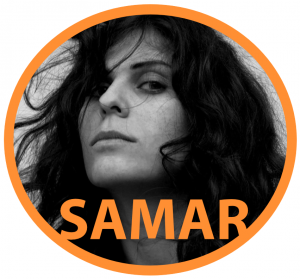 In Jordan, we regularly celebrated within a white dove complex.
In Jordan, we regularly celebrated within a white dove complex.
One day at school, the teacher told us about what is known in Jordan as the civil war of the 1970s, or “Sad September,”[1] a month when, allegedly, Palestinian freedom fighters tried to take over Jordan. The teacher repeatedly emphasized that we should always be thankful for the blessing of peace and security and hope that those days never return.
When I came home, I told my mother. She asked me, in full destruction, to interrupt and zoom out.
My mother told me about a night in the 1970s when, during the so-called civil war in Jordan, a bullet almost killed her.
She was sitting on her favorite couch in her house in Amman. She went to get a glass of water. She heard the shooting. When she came back, a bullet had come through the window and landed in the middle of the couch where she had been sitting.
She wasn’t sure who had fired the bullet, as the streets were chaotic. However, she was very sure it was never a civil war. Her father was a general in the army, and at their family house, they used to hide and care for wounded Palestinian freedom fighters.
Putting adjectives in front of wars—calling it a “civil war”—has been a continuous trap to normalize the ongoing genocidal occupation of the people in occupied Palestine for more than 75 years. A trap to shift our narratives and efforts from liberation against the Zionist, militarized, imperialist-backed project to a simplified narrative of “war versus peace.”
In another instance, I remember watching TV as a young person, seeing the dictator Saddam’s statue fall before a crowd in Baghdad in 2003. Some clapped, some cried. But Abeer Al-Janabi, a 14-year-old girl, was raped, and her whole family murdered by the American occupying army in 2006.
Today, the Iraqi parliament is passing laws that legalize the rape of 9-year-old girls under the guise of institutionalized capitalist arrangements called “marriage.”
After the fall of Baghdad, a professor at the University of Jordan once again said, “Thank God for the blessing of peace and security.” But I did not thank God, and I never will—I’ve always been an atheist child.
The so-called security in Jordan, allegedly linked to peace, is the same as in Egypt and every location ruled by U.S.-backed, patriarchal, dictatorial, army-based regimes. Under cybersecurity laws, women and people with diverse gender identities are arrested and imprisoned for self-expression—just like peaceful activists for the liberation of Palestine.
For example, in 2023, Anas Al-Jamal, one of many Free Palestine activists in Jordan, was arrested over a social media post. In 2024, Suzy Al-Ordoneya, a social media influencer in Egypt, was arrested for “indecent language” during a livestream. She was sentenced to two years in prison.
Any word that challenges patriarchal, imperial-backed systems is labeled “indecent.”
Any existence of women and people of all genders outside patriarchal imperial norms—just like Free Palestine activists—is seen as a threat.
In recent years, I have seen many international campaigns supporting the Saudi Vision 2030, where Mohammed bin Salman, the Crown Prince of Saudi Arabia, aims to attract 100 million tourists by 2030.
With this vision, fake reforms have been introduced to whitewash women’s repression, such as “allowing” women to drive or “reducing” penalties for clothing choices. However, the Saudi patriarchal and Islamist government continues to arrest women for not wearing the abaya[2], for questioning male guardianship, or simply for existing.
In 2024, while Mohammed bin Salman hosted Hollywood stars, his repressive government sentenced a Saudi woman, Manahel Al-Otaibi, to 11 years in prison for not wearing the abaya in public—an explicit example of Americanized whitewashing as geopolitical violence against women in Saudi Arabia.
Recently, Trump signed an arms deal worth billions with the Saudi government, a trade framed as part of his broader vision for “peace.” This costly arms trade exploits peace as a tool to normalize Zionist genocidal oppression in Palestine.
Moreover, it whitewashes geopolitical violence against women in Saudi Arabia and beyond, as the Saudi patriarchal government now plays male guardian over the “new Syria.”
A new Syria in the white dove complex.
We celebrate the U.S. removal of sanctions on Syria without questioning the price—without questioning why the U.S. has the power to impose sanctions in the first place.
We celebrate the dove leaving the cage, only to see it captured again.
And the talk is long, but dear reader, I’ll leave that for another letter.
I’ll close this letter by quoting Simone de Beauvoir:
“All oppression creates a state of war. And this is no exception.”
Step out from the simplified ceremonies of war versus peace, and let us unite to demolish systems of oppression.
Demolishing the genocidal Zionist occupation of Palestine is an act of intersectional liberation. It means withdrawing support from militarized, profit-driven regimes, their dictatorial agents, and the U.S. patriarchal imperial engine of war and profit.
Finally, the white dove complex is the trap of profit-making peace.
It cages us, then frees us—and we enter the loop of chasing temporary freedoms instead of questioning and dismantling the cage, and the system that built it.
****
[1] It is known as Black September, a month marked by armed conflict between the Jordanian army and Palestinian freedom fighters. However, the author used “Sad September” to avoid reproducing racist narratives in which “black” is associated with unfortunate events.
[2] An abaya is a long, loose-fitting cloak, sometimes imposed and sometimes worn by choice by women, particularly in the Arabian Peninsula, as a form of modest dress.
Contacts:
- Facebook: Samar Zughool
- Instagram: @Samar.zughool2021
- Linkiden: Samar Zughool

